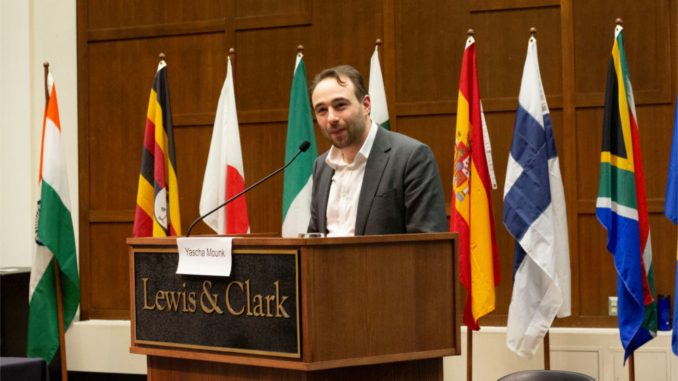
Focusing on everything from nuclear disarmament and private military contractors to human rights and nongovernmental organizations (NGOs), Lewis & Clark’s 57th International Affairs Symposium, “Challenges to the Status Quo: A System Unraveling?” explored the forces defying widely-accepted political norms and institutions.
The symposium consisted of six debates, and ran from Monday, April 8 through Wednesday, April 10. The oldest student-run symposium in the country, this year’s event was cochaired by two international affairs majors, Nejra Gradan ’19 and Emina Ema Ibisević ’19, both hailing from Bosnia and Herzegovina. They were supported by a 12-member student steering committee, representing a variety of disciplines at LC and six different countries.
“There were many different experiences that (committee members) could bring into the conversation,” Gradan said. “A lot of the things we talked about related to countries that they are from or they had some kind of personal experience that they could contribute. I think that really contributed to the quality of the topics that we decided to go forward with in the end.”
Of the 12 speakers who were invited, five were sourced internationally, representing Panama, Uganda, Canada, Finland and Spain. By bringing in diverse perspectives, the committee aimed to appeal to a variety of disciplines on campus.
“We tried to broaden what people see as International Affairs because it isn’t only security, it isn’t only theories — there’s so much more than that,” Ibisević said.
The Monday evening keynote debate, titled “The Populist Disruption: Make Democracy Great Again,” focused on recent populist uprisings and the crisis of representation within democratic systems and institutions. It begged the question, “Can democracy be fixed?”
The keynote speaker, German-American political analyst Yascha Mounk, is a leading expert on the crisis of liberal democracy and the rise of populism. He argued that while democracy may be flawed, the underlying principles are worth fighting for.
Mounk debated Richard Morales, an executive counselor and former presidential candidate for the Frente Amplio por la Democracia (FAD), a political party in Panama. Morales advocated for more radical change and contested the entire notion of liberal democracy, which is supposed to prioritize individual rights.
“I think democracy is a powerful force for change, but we have to question if what we have is truly democratic,” Morales said prior to the debate. “We need a democracy that’s more participative where citizens get involved and have actual power making decisions, not only electing their representatives.”
Morales started off the debate framing the social, environmental and economic crisis at hand. He argued that this crisis is the result of a political system which concentrates policy-making power into the hands of the elite.
“Liberal democracy is the political organization of capitalism,” Morales said. “It’s a political system that has been unable to satisfy the wants and needs of societies at large. But, not only has it been incapable of solving these needs, of solving this social, ecological crisis, it has been complacent in causing it.”
Instead of critiquing the entire concept of liberal democracy, Mounk deemed populist movements, such as those in the U.S., India, Brazil and Indonesia, a serious threat. He argued that the problem is not liberal democracy itself, but the populist leaders that are taking advantage of the system.
“I argue that our system is in need of real reform, that there’s lots of changes we need to make, but the beauty of our political system is that we have the institutions and the liberties to fight for those changes within the system,” Mounk said.
Mounk also argued that capitalism, while in need of great regulation and reform, should not be abolished entirely, noting that there has never been a democracy in the history of the world that was not capitalist.
After the speakers each articulated their arguments, time was allocated for the moderator, Dr. Robert B. Pamplin Jr. Associate Professor of Government and Political Science Department Chair Todd Lochner, to ask questions. He started by addressing Morales’ push for greater political participation, asking how he would solve collective action problems and gaps in education.
“Given the chance to participate in public deliberation, to be properly informed, people would make the intelligent, rational choices most of the time,” Morales said. “I believe that democracy involves trust for people, that if you trust people to make intelligent decisions, the same we are trusting our technocrats to make intelligent decisions, that people would rationally make the better choices.”
Lochner next directed a question at Mounk.
“If you had to choose between liberalism and democracy, which would you choose and can you convince me that we are not going to have to make that choice?” Lochner said.
Mounk argued that it is impossible to separate liberalism and democracy, and trying to separate them is a mistake; illiberal democracies will eventually tend towards authoritarianism and liberal non democracies will inherently restrict people’s political freedoms and tend towards illiberalism. On the other hand, Morales argued that liberalism and capitalism have already been chosen over democracy and proper representation, pushing for a new form of democracy entirely.
Both Mounk and Morales embraced the debate format, filling the time with fiery exchanges all while maintaining a productive conversation — the purpose of the event.
Gradan noted that the debate format allows a deep dive into critical topics.
“We don’t want to give people answers to something,” Gradan said. “Sometimes the point of exposing our audience to two different points of view is so they can leave that session and think about it at home and use what they know about that topic and what they heard and create their own opinion.”
Subscribe to the Mossy Log Newsletter
Stay up to date with the goings-on at Lewis & Clark! Get the top stories or your favorite section delivered to your inbox whenever we release a new issue.

Leave a Reply